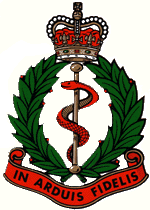
Photo from wikipedia
INTRODUCTION The role of the military medical officer is complex, as it encapsulates officer, physician, and leader. Professional identity formation is therefore essential for military medical students and junior military… Click to show full abstract
INTRODUCTION The role of the military medical officer is complex, as it encapsulates officer, physician, and leader. Professional identity formation is therefore essential for military medical students and junior military physicians to successfully execute the responsibilities of the military medical officer in their future careers. Because little is known regarding best practices for professional identity formation training for military physicians, this study explored the ways in which medical students conceptualized the complex roles of the military medical officer during a medical field practicum. MATERIALS AND METHODS Guided by the phenomenological tradition of qualitative research, we interviewed 15 fourth-year medical students twice regarding their understanding of the role of the military medical officer, as they progressed through a 5-day high-fidelity military medical field practicum, Operation Bushmaster. Our research team then analyzed the interview transcripts for emerging themes and patterns, which served as the results of this study. RESULTS The following themes emerged from the data regarding the participants' conceptualization of the military medical officer: (1) the scope of the role of the military medical officer; (2) the intersecting identities of the military medical officer; and (3) the adaptable role of the military medical officer in an operational environment. As they progressed through the medical field practicum, the participants articulated a clear understanding of the vast and complex nature of the military medical officer's intersecting roles as officer, physician, and leader in austere and often unpredictable environments. At the end of the medical field practicum, the participants expressed confidence in carrying out their roles as military medical officers during their future deployments. CONCLUSIONS This study provided an in-depth understanding of the participants' conceptualization of the military medical officer. The participants described how the medical field practicum provided them with opportunities to experience first-hand and therefore better understand the roles of the military medical officer while leading a health care team in an operational environment. As a result, high-fidelity medical field practicums like Operation Bushmaster appear to be an effective tool for facilitating professional identity formation.
Journal Title: Military medicine
Year Published: 2022
Link to full text (if available)
Share on Social Media: Sign Up to like & get
recommendations!